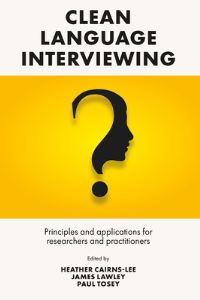In the latest issue of Scientific American Mind, Siri Carpenter, PhD social psychology from Yale University, reviews the recent research into embodied cognition.[1] She writes:
Why do we look up to those we respect, stoop to the level of those we disdain and think warmly about those we love? Why do we hide dirty secrets or wash our hands of worries? Why do we ponder weighty subjects and feel a load lift after we have made a decision? Why do we look back on the past and forward to the future?
Such turns of phrase, invoking a physical reality that stands in for intangible concepts, might seem like linguistic flights of fancy. But a rapidly growing body of research indicates that metaphors joining body and mind reflect a central fact about the way we think: the mind uses the body to make sense of abstract concepts.
As far-fetched as such sensory non sequiturs may seem, the evidence for “embodied” or “grounded” cognition is persuasive. “The empirical case is becoming increasingly overwhelming,” says psychologist Lawrence Barsalou of Emory University. “Cognition is emerging, to a significant extent, from all these things—like warmth, cleanliness and weight—that we used to think were irrelevant to cognition.”
Carpenter asks:
I accept the “too fleeting” and “preposterous” explanations. But “too trivial”? I think not, unless you are someone who continues to cling to the idea that the mind can, like some apparition, operate without a body.
I also think there is another explanation. We have unwittingly trained our attention to notice other things. For example, in a sentence the long words often catch our attention. What is more, these words are often action or event words turned into static nouns by a process called ‘nominalisation’. Put differently, embodied metaphors are converted to disembodied concepts. (Compare your internal experience of ‘relating’ to ‘relationship’.) Academic writing demands the maximal use of nominalisation, often to the exclusion of all mention of the writer and in particular their body. However, since it is virtually impossible to convey new ideas without the use of implicit metaphor, even the most traditional of academics unwittingly reveal their inner worlds – and their biases.
From an embodied cognition viewpoint the small, implicitly metaphorical words that are all but ignored prove the most interesting. If a person says “I bounce back from disappointments in life,” ‘disappointment’ will be the word that likely captures attention. Whereas, the embodied metaphor ‘bounce back’ gives much more of a sense of how this person experiences those moments they categorise as disappointing. One way to grasp this is to notice how different your sense of this person’s experience would be if they were instead to say:
I get over disappointments in life.
I deal with disappointments in life.
I get round disappointments in life.
I handle disappointments in life.
I push through disappointments in life.
If you pay close attention to your body when you ‘take on’ each one of these sentences you may discern subtle (or not) differences in your micro-muscular movements [2] and in your sense of orientation (and I’m not counting the differences in visual or auditory imagery that may accompany these body changes). They may be “fleeting” but these sensations are far from “trivial” as the rapidly growing number of experiments on embodied cognition have shown in the last three years.
These sensations are not emotions or feelings (in the everyday sense of emotion or sense of touch). In many therapy and counselling schools, people who do not speak emotions are considered ‘out of touch with their feelings’ whereas they may be very in touch with their proprioceptive senses.[3] Many facilitators ignore their client’s use of words like balance, inclined, spin, turn round, angle, rest, etc. etc. and clients who are highly developed in these senses can end up feeling there is something wrong with them because they don’t speak emotion fluently.
In my next blog I will examine a related notion, thinking is simulation.
References and notes
1 Scientific American Mind (Jan/Feb 2011, pp. 38-45) ‘Body of Thought: Fleeting sensations and body movements hold sway over what we feel and how we think’. Full article at: http://www.scientificamerican.com/article.cfm?id=body-of-thought
2 I first came across the term “micro-muscular movements” (as part of the process of NLP modelling) on a PPD Master Practitioner module led by Charlotte Bretto in 1992.
3 Proprioception:
Note we have several more than ‘the five senses’. One of the first systematic examinations of our use of words related to our proprioceptive senses was ‘The Vestibular System in NLP’ by Cecile Carson in Bretto, Charlotte, Judith DeLozier, John Grinder, Sylvia Topel, (Eds.), Leaves Before the Wind, Grinder, DeLozier & Associates, Bonnydoon, CA, pp. 181-194, 1991.
See: Penny Tompkins and James Lawley’s ‘Body Awareness’ for an article which discusses body metaphor and in particular ‘balance’.
A few weeks ago Penny and I were traveling on one of the world’s largest cruise ships. I was amazed that at certain moments Penny would interrupt our conversation to inform me the ship had just changed direction. We were out of sight of land and I didn’t notice any change, but Penny’s finely attuned proprioceptive sense detected a slight shift. On the first few occasions I looked at the ship’s wake to check Penny’s sense and found it was indeed accurate.








